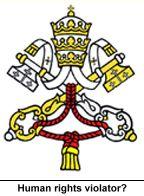California Catholic Daily
May 16, 2011
http://www.calcatholic.com/news/newsArticle.aspx?id=6592b62c-8be5-4150-b531-708166e463c0
 |
Amnesty International, which promotes abortion as a human right, has singled out the Vatican for criticism in its 2011annual report, claiming the Holy See has failed to adequately protect children from sexual abuse.
The report, published Friday, May 13, reviewed 157 countries for human rights violations and, for the first time ever, included the Vatican. With regard to the sexual abuse of children, said the report, "The Holy See did not sufficiently comply with its international obligations relating to the protection of children."
"Increasing evidence of widespread child sexual abuse committed by members of the clergy over the past decades, and of the enduring failure of the Catholic Church to address these crimes properly, continued to emerge in various countries," said the report. "Such failure included not removing alleged perpetrators from their posts pending proper investigations, not cooperating with judicial authorities to bring them to justice and not ensuring proper reparation to victims."
While the report did give credit to Pope Benedict XVI for taking steps to combat and prevent the sexual abuse of children and to appropriately deal with priests engaged in such conduct, it faulted the Holy See for its lack of transparency. "Canon law does not include an obligation for church authorities to report cases to civil authorities for criminal investigation," said the report. "Secrecy is mandatory throughout the proceedings."
Bill Donohue of the Catholic League for Religious and Civil Rights immediately issued a statement pointing out that the Amnesty International Report "lists not a single instance of a human rights violation that took place anywhere in the world in 2010 under the auspices of the Holy See, yet it still managed to condemn its human rights record."
"This is ideology at work, not objective research," said the Catholic League's statement. "Coming up empty with cases of abuse that occurred last year, it decided to adopt a 'look-back' strategy, one that it exclusively applied to the Catholic Church: the Annual Report on the other 156 nations details human rights violations that occurred in 2010."
Donohue called it "preposterous to hold the Vatican responsible for the behavior of priests all over the world," and noted "the vast majority of incidents of homosexual priests who preyed on adolescents occurred between the mid-1960s and the mid-1980s, having nothing to do with any alleged culpability on the part of the Holy See in 2010."
Relations between the Catholic Church and Amnesty International have been deteriorating since 2007, when the international human rights watchdog decided to change its longstanding policy of neutrality on abortion and declare it, too, as a human right.
The decision prompted a statement by the U.S. Conference of Catholic Bishops in July 2007 calling on Amnesty International to reverse the decision – something the group has so far refused to do.
Cardinal Renato Martino, then-president of the Pontifical Council for Justice and Peace, was quoted in the USCCB news release as saying, "if in fact Amnesty International persists in this course of action, individuals and Catholic organizations must withdraw their support, because, in deciding to promote abortion rights, Amnesty International has betrayed its mission."
The decision by Amnesty International to support abortion across the globe undermined the group's "longstanding moral credibility, diverts its mission, divides its own members (many of whom are Catholic or defend the rights of unborn children), and jeopardizes Amnesty's support by people in many nations, cultures and religion," said Bishop William S. Skylstad, then president of the USCCB.
Ironically, Amnesty International was founded by Peter Benenson, a Catholic layman.
Any original material on these pages is copyright © BishopAccountability.org 2004. Reproduce freely with attribution.